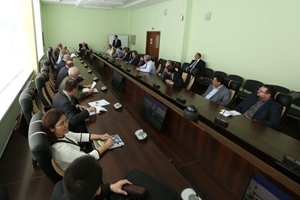Ru
|
Eng
European Commission experts to independently evaluate Belarusian nuclear power plant stress tests
29.05.2017

An expert group of the European Commission will provide an independent evaluation of results of stress tests of the Belarusian nuclear power plant. Belarusian Deputy Energy Minister Mikhail Mikhadyuk made the statement as he answered questions of foreign diplomats after their tour of the Belarusian nuclear power plant’s construction site on 26 May, BelTA has learned.
The official said: “We have done the stress tests. They were done in line with instructions that take into account requirements of European regulations as well. Our regulating agency [the Nuclear and Radiation Safety Department of the Belarusian Emergencies Ministry] is now busy compiling the national repot on the stress tests. The report will be forwarded to the European Commission. We have consulted with the European Commission about the possibility of getting an independent evaluation. The official letter requesting such an independent evaluation has already been sent to the European Commission.”
Mikhail Mikhadyuk went on saying that the European Commission will set up an expert group to perform the independent evaluation of the Belarusian nuclear power plant’s stress tests.
Belarus stress-tested its nuclear power plant in 2016 using European methods and taking into account recommendations based on the European Commission’s and the European Nuclear Safety Regulators Group’s (ENSREG) specifications. As part of the stress testing process the resilience of the Belarusian nuclear power plant as well as its adaptation to extreme impacts was tested. The safe operation of the nuclear power plant in the face of extreme external impacts was tested. Consequences of natural phenomena were forecasted such as combinations of floods, extreme weather conditions and external impacts, consequences of the nuclear power plant’s losing safety functions due to the loss of external power.
About 25 diplomats, who are accredited in Belarus, came for a tour of the construction site of the Belarusian nuclear power plant on 26 May. The number included heads of diplomatic missions and charges d’affaires. In particular, ambassadors of Russia, the UAE, Palestine, the UK, Turkey, Germany, Ukraine, Serbia, Romania, and Turkmenistan were made familiar with the Belarusian nuclear power plant construction progress. Diplomats from Slovakia, Czechia, Poland, Japan, Hungary, the USA, and Netherlands also came to Ostrovets.
The Belarusian nuclear power plant is a project to build a new-generation nuclear power plant with two VVER-1200 type reactors (1,200MW each) 18km away from Ostrovets, Grodno Oblast. The first power-generating unit is scheduled for commissioning in 2019, with the second one to go online in 2020.
BELNPP: NEWS FROM CONSTRUCTION SITE
23.07.2024
11.07.2024
28.06.2024
06.06.2024
04.06.2024
04.06.2024
03.06.2024
24.05.2024
23.05.2024
03.05.2024













